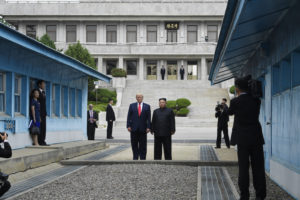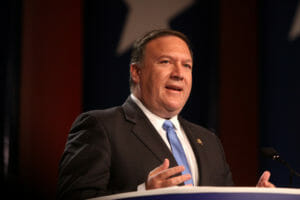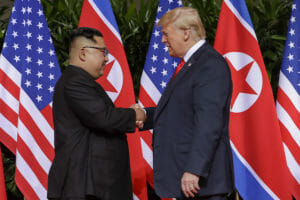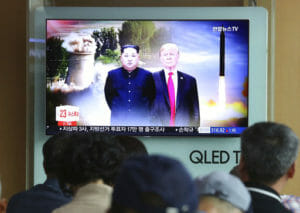Pompeo in North Korea to Nail Down Details of Agreement
The U.S. secretary of state, visiting Pyongyang, vows to define the commitments that Kim Jong Un made to President Trump about denuclearization.PYONGYANG, North Korea — Secretary of State Mike Pompeo began his first trip to Pyongyang since President Donald Trump’s summit with leader Kim Jong Un last month with a vow to nail down the specifics of the commitments Kim made on denuclearization.
Pompeo has the crucial task of dispelling growing skepticism over how seriously Kim is about giving up his nuclear arsenal and translate the upbeat rhetoric following the first meeting between leaders of the U.S. and North Korea into concrete action.
He was met at the Pyongyang airport by Kim Yong Chol, a senior ruling party official and former intelligence chief, and Foreign Minister Ri Yong Ho to begin his third visit since April and first since the June 12 summit.
“Our leaders made commitments at the Singapore summit on the complete denuclearization of North Korea and outlined what a transformed US-DPRK relationship could look like,” he said while still en route, according to comments relayed to reporters on his plane by spokeswoman Heather Nauert.
DPRK is the abbreviation of the authoritarian nation’s official name, the Democratic People’s Republic of Korea.
“On this trip I’m seeking to fill in some details on these commitments and continue the momentum towards implementation of what the two leaders promised each other and the world. I expect that the DPRK is ready to do the same,” Pompeo said.
One hoped-for breakthrough during his visit would be the return of the remains of U.S. GIs killed during the 1950-53 Korean War. Both sides have suggested Pyongyang is willing to turn over dozens if not hundreds of sets of remains.
But just before Pompeo’s arrival, the North’s state-run media lobbed a warning shot at Washington over its criticism of the North’s human rights record.
The criticism, published on North Korea’s government-run Uriminzokkiri website, said Washington should stop provoking the North with an “anachronistic human rights racket” at a time of diplomatic attempts to improve ties.
What position it will take on the nuclear issue appears to be anything but a done deal.
Over the past quarter-century, North Korea has frustrated or outfoxed U.S. administrations that have attempted to stop and reverse its weapons development through diplomacy and sanctions. Since the summit, doubts over the North’s intentions have grown again, amid reports that it is continuing to expand facilities related to its nuclear and missile programs and that U.S. intelligence is skeptical about its intentions to give up its weapons.
Asked Thursday if North Korea was hiding nuclear facilities the president said: “We’ll see. All I can tell you is this. You haven’t had one missile launch and you haven’t had one rocket launch or you haven’t had any nuclear tests.”
Speaking aboard Air Force One on a trip to Montana, Trump said he believed he forged a personal connection with the young autocrat he once pilloried as “Little Rocket Man.”
“I had a very good feeling about him. … I shook his hand, I felt we got along very well,” Trump told reporters. “I think we understand each other. I really believe that he sees a different future for North Korea. … I hope that’s true. If it’s not true, then we go back to the other way, but I don’t think that’s going to be necessary.”
Pompeo will put that proposition to the test and help lay to rest doubts over whether the president, who has already ordered a suspension of large-scale U.S. military drills with South Korea, is overeager to claim a success.
National security adviser John Bolton, who has expressed hardline views on North Korea, said Sunday that Pompeo will present Pyongyang with a plan to complete the dismantling of the North’s nuclear and missile programs in one year. On Tuesday, Nauert walked that back, declining to give a timeline.
This will be Pompeo’s third trip to North Korea in three months. He last visited in May ahead of the Trump-Kim summit and traveled there secretly in early April while he was director of the CIA.
Pyongyang is the first stop on his first around-the-world trip as America’s top diplomat. He will then travel to Japan, Vietnam and the United Arab Emirates before heading to Belgium, where he will accompany Trump at the NATO summit in Brussels.
___
AP Pyongyang bureau chief Eric Talmadge, in Tokyo, and writer Kim Tong-Hyung in Seoul, South Korea contributed to this report.
Your support matters…Independent journalism is under threat and overshadowed by heavily funded mainstream media.
You can help level the playing field. Become a member.
Your tax-deductible contribution keeps us digging beneath the headlines to give you thought-provoking, investigative reporting and analysis that unearths what's really happening- without compromise.
Give today to support our courageous, independent journalists.






You need to be a supporter to comment.
There are currently no responses to this article.
Be the first to respond.